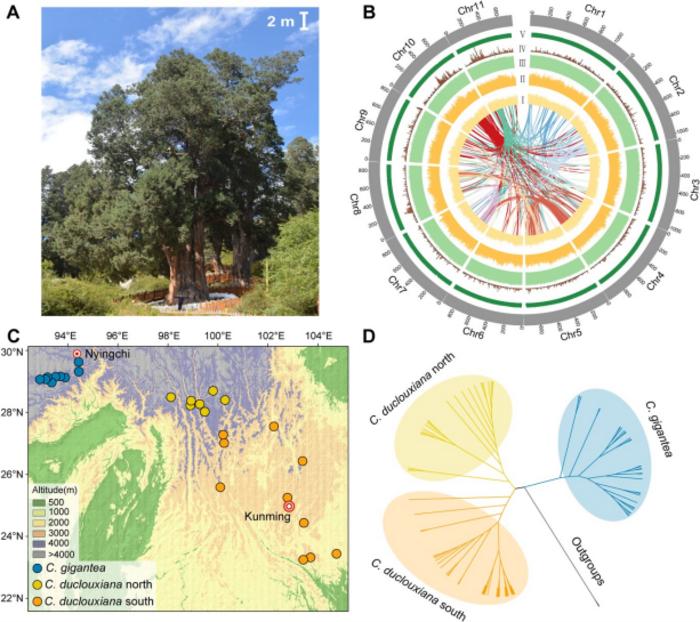In a remarkable twist of evolutionary adaptation, the rare Tibetan cypress, Cupressus gigantea, has shown unexpected genetic resilience. Despite facing the brink of extinction due to climate change and habitat loss, the species has experienced a significant reduction in harmful genetic mutations. This discovery sheds new light on the complex interplay between genetic diversity and population decline, challenging conventional understandings of genetic load in endangered species.

Credit: Horticulture Research
In a remarkable twist of evolutionary adaptation, the rare Tibetan cypress, Cupressus gigantea, has shown unexpected genetic resilience. Despite facing the brink of extinction due to climate change and habitat loss, the species has experienced a significant reduction in harmful genetic mutations. This discovery sheds new light on the complex interplay between genetic diversity and population decline, challenging conventional understandings of genetic load in endangered species.
Conifers, including Cupressus species, are ecologically and culturally significant, but many are threatened by climate change and human activities. The rare conifer Cupressus gigantea, found on the Qinghai-Tibet Plateau, faces severe population declines and habitat loss. This species’ survival amidst such challenges necessitated an in-depth investigation into its genetic and evolutionary resilience. Due to these issues, a detailed genetic study was essential.
Researchers from Sichuan University and their collaborators published a study (DOI: 10.1093/hr/uhae108) in Horticulture Research on April 11, 2024, detailing the genetic history and survival strategies of the rare conifer Cupressus gigantea. The study, which involved sequencing the species’ genome and comparing it with the genome of C. duclouxiana, offers new insights into how this endangered conifer has adapted to its environment through genetic purging.
The study produced a high-quality genome sequence for Cupressus gigantea and conducted population genetic analyses across various populations. The results revealed that C. gigantea possesses fewer deleterious mutations compared to its widespread relative, C. duclouxiana, thanks to purifying selection during inbreeding periods. This process has helped maintain the species’ genetic health despite its small population size. Researchers reconstructed the demographic history of both species, discovering that C. gigantea experienced severe population bottlenecks, facilitating the purging of harmful mutations. The study highlighted the contrasting demographic histories of the two species, with C. duclouxiana showing population recovery, while C. gigantea continued to decline due to habitat constraints and human activities. These findings underscore the importance of genetic purging in the survival and adaptation of long-lived conifers facing environmental challenges.
Dr. Susanne S. Renner, a leading authority in plant biology and co-author of the study, emphasizes the significance of these findings, stating, “The genetic purging observed in Cupressus gigantea provides a remarkable example of natural selection at work, offering valuable lessons for conservation biology.”
The insights gained from this study can inform conservation strategies for C. gigantea and other endangered species with similar life histories. By recognizing the importance of genetic purging, conservationists can develop more targeted approaches to managing genetic diversity and enhancing the resilience of small, isolated populations. This research emphasizes the need to consider genetic factors in conservation planning to ensure the long-term survival of endangered conifers.
###
References
DOI
Original Source URL
Funding information
This work was financially supported by the National Natural Science Foundation of China (Grant/Award Number U20A2080), the Second Tibetan Plateau Scientific Expedition and Research (STEP) program (Grant/Award Number 2019QZKK05020110), the Sichuan Science and Technology Program (Grant/Award Number 2023NSFSC0186), the Fundamental Research Funds for the Central Universities of Sichuan University (Grant/Award Numbers SCU2021D006 and SCU2022D003), and the Institutional Research Fund from Sichuan University (2021SCUNL102).
About Horticulture Research
Horticulture Research is an open access journal of Nanjing Agricultural University and ranked number one in the Horticulture category of the Journal Citation Reports ™ from Clarivate, 2022. The journal is committed to publishing original research articles, reviews, perspectives, comments, correspondence articles and letters to the editor related to all major horticultural plants and disciplines, including biotechnology, breeding, cellular and molecular biology, evolution, genetics, inter-species interactions, physiology, and the origination and domestication of crops.
Journal
Horticulture Research
Subject of Research
Not applicable
Article Title
Efficient purging of deleterious mutations contributes to the survival of a rare conifer
Article Publication Date
11-Apr-2024
COI Statement
The authors declare that they have no competing interests.



